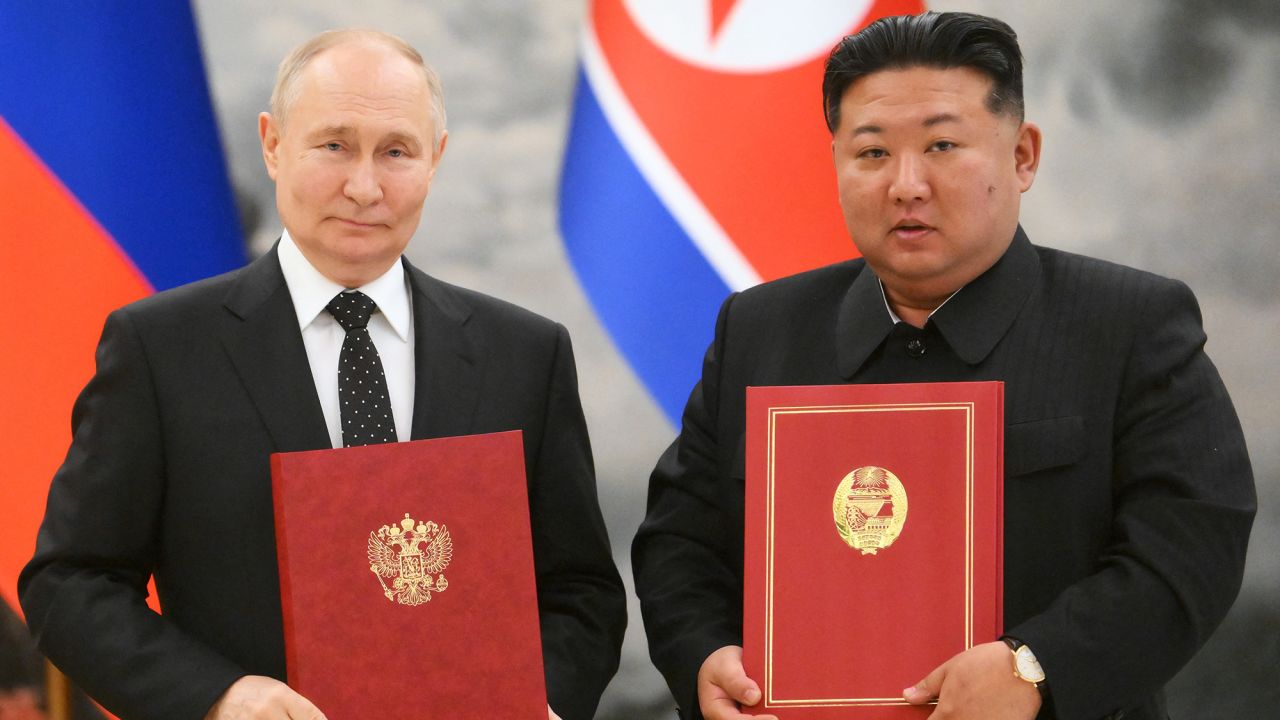A Landmark Agreement
In a move that could redefine geopolitical dynamics, Russian President Vladimir Putin and North Korean leader Kim Jong Un signed a strategic partnership agreement, pledging mutual aid against aggression. This historic deal, signed in Hanoi, Vietnam, represents the strongest connection between Moscow and Pyongyang since the Cold War. As both nations face escalating conflicts with the West, this partnership marks a significant upgrade in their bilateral relations, encompassing security, trade, investment, cultural, and humanitarian ties.
Strengthening Alliances: A New Chapter in Russia-North Korea Relations
Historical Context
The roots of Russia-North Korea relations date back to the Soviet era. In 1961, the two countries signed a treaty obligating Moscow to intervene militarily if North Korea was attacked. This treaty was discarded after the collapse of the USSR, and a weaker version replaced it in 2000. The recent agreement could signal a return to a more robust alliance, though the exact details of mutual assistance remain unclear.
Strategic Interests
During Putin’s first visit to North Korea in 24 years, Kim Jong Un described the agreement as their “strongest ever treaty,” pledging full support for Russia’s actions in Ukraine. Putin echoed this sentiment, calling it a “breakthrough document” and highlighting shared goals against Western policies.
Mutual Aid and Military Cooperation
Arms and Technology Exchange
One of the critical concerns surrounding this partnership is the potential arms arrangement. The U.S. and its allies have expressed fears that North Korea might supply Russia with munitions for the Ukraine conflict in exchange for economic aid and technology transfers, which could enhance Pyongyang’s nuclear and missile programs. U.S. officials claim that North Korea has already provided Russia with artillery, missiles, and other military equipment.
Geopolitical Implications
The agreement comes at a time of heightened tensions. Both nations are under heavy sanctions—North Korea for its weapons program and Russia for its invasion of Ukraine. By aligning more closely, they aim to counteract these pressures and support each other against Western adversaries.
Diplomatic Engagements and Regional Reactions
Putin’s Diplomatic Tour
Following the summit in North Korea, Putin traveled to Vietnam, emphasizing the importance of strengthening ties with long-time partners. In Hanoi, he met with Vietnam’s top leaders, seeking to bolster Russia’s presence and influence in Southeast Asia.
Regional and Global Responses
The strategic partnership has sparked various reactions. U.S. Secretary of State Antony Blinken criticized the move, suggesting it illustrates Russia’s desperation to maintain its war efforts in Ukraine. Meanwhile, South Korean officials are closely monitoring the situation, particularly how Russia might respond if North Korea faces aggression.
China, North Korea’s most significant ally, maintained a neutral stance, describing the high-level exchanges as bilateral arrangements between sovereign states. However, this partnership could potentially shift regional dynamics, impacting China’s strategic interests as well.
Economic and Humanitarian Dimensions
Trade and Investment
The agreement also promises to enhance economic cooperation. This includes potential expansions in trade, agriculture, fisheries, mining, and tourism. North Korea could increase labor exports to Russia, defying UN sanctions, to gain foreign currency. These economic engagements are crucial for both nations as they navigate their respective sanctions regimes.
Cultural and Humanitarian Ties
Cultural and humanitarian cooperation forms another critical aspect of the partnership. This could involve joint cultural projects, educational exchanges, and humanitarian aid, fostering deeper people-to-people connections and mutual understanding.
The Broader Implications for Global AI Adoption
Privacy Concerns and Trust Building
The lessons from the Russia-North Korea partnership extend beyond geopolitics, offering insights into the broader adoption of AI and technology. One key takeaway is the importance of addressing privacy concerns to build trust. Similar to the strategic negotiations between nations, AI adoption in various sectors requires transparency, communication, and assurances of data protection to gain user confidence.
Data Utilization and Strategic Implementation
The agreement highlights the necessity of meaningful data utilization and strategic implementation. Just as the partnership aims to leverage mutual strengths effectively, AI initiatives must focus on actionable insights and practical applications rather than mere data collection. Rigorous evaluation and clear guidelines are essential to ensure that technological advancements lead to tangible benefits.
Conclusion: A Strategic Shift with Global Repercussions
The Russia-North Korea strategic partnership represents a significant shift in global geopolitics, with far-reaching implications. By aligning closely, both nations aim to bolster their positions against Western adversaries, enhance their economic and military capabilities, and navigate the challenges posed by international sanctions. As this partnership evolves, it will be crucial to monitor its impact on regional stability, global security, and the broader adoption of AI and technology.

